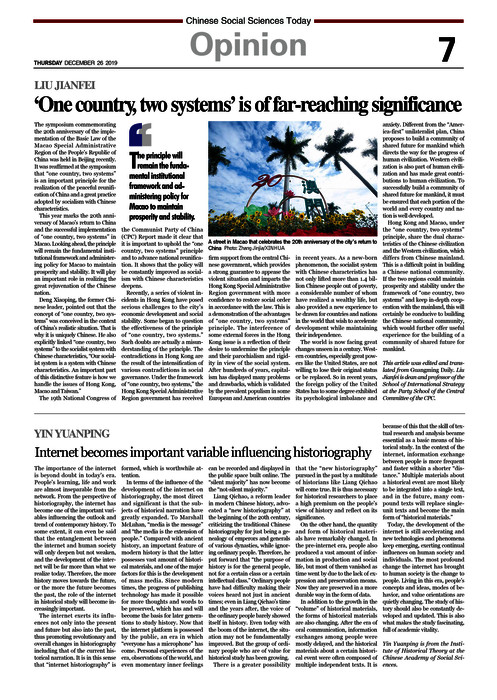Internet becomes important variable influencing historiography
2019-12-26 10:33:08
The importance of the internet is beyond doubt in today’s era. People’s learning, life and work are almost inseparable from the network. From the perspective of historiography, the internet has become one of the important variables influencing the outlook and trend of contemporary history. To some extent, it can even be said that the entanglement between the internet and human society will only deepen but not weaken, and the development of the internet will be far more than what we realize today. Therefore, the more history moves towards the future, or the more the future becomes the past, the role of the internet in historical study will become increasingly important.
The internet exerts its influences not only into the present and future but also into the past, thus promoting revolutionary and overall changes in historiography including that of the current historical narration. It is in this sense that “internet historiography” is formed, which is worthwhile attention.
In terms of the influence of the development of the internet on historiography, the most direct and significant is that the subjects of historical narration have greatly expanded. To Marshall McLuhan, “media is the message” and “the media is the extension of people.” Compared with ancient history, an important feature of modern history is that the latter possesses vast amount of historical materials, and one of the major factors for this is the development of mass media. Since modern times, the progress of publishing technology has made it possible for more thoughts and words to be preserved, which has and will become the basis for later generations to study history. Now that the internet platform is possessed by the public, an era in which “everyone has a microphone” has come. Personal experiences of the era, observations of the world, and even momentary inner feelings can be recorded and displayed in the public space built online. The “silent majority” has now become the “not-silent majority.”
Liang Qichao, a reform leader in modern Chinese history, advocated a “new historiography” at the beginning of the 20th century, criticizing the traditional Chinese historiography for just being a genealogy of emperors and generals of various dynasties, while ignoring ordinary people. Therefore, he put forward that “the purpose of history is for the general people, not for a certain class or a certain intellectual class.” Ordinary people have had difficulty making their voices heard not just in ancient times; even in Liang Qichao’s time and the years after, the voice of the ordinary people barely showed itself in history. Even today with the boom of the internet, the situation may not be fundamentally improved. But the group of ordinary people who are of value for historical study has been growing.
There is a greater possibility that the “new historiography” pursued in the past by a multitude of historians like Liang Qichao will come true. It is thus necessary for historical researchers to place a high premium on the people’s view of history and reflect on its significance.
On the other hand, the quantity and form of historical materials have remarkably changed. In the pre-internet era, people also produced a vast amount of information in production and social life, but most of them vanished as time went by due to the lack of expression and preservation means. Now they are preserved in a more durable way in the form of data.
In addition to the growth in the “volume” of historical materials, the forms of historical materials are also changing. After the era of oral communication, information exchanges among people were mostly delayed, and the historical materials about a certain historical event were often composed of multiple independent texts. It is because of this that the skill of textual research and analysis became essential as a basic means of historical study. In the context of the internet, information exchange between people is more frequent and faster within a shorter “distance.” Multiple materials about a historical event are most likely to be integrated into a single text, and in the future, many compound texts will replace single-unit texts and become the main form of “historical materials.”
Today, the development of the internet is still accelerating and new technologies and phenomena keep emerging, exerting continual influences on human society and individuals. The most profound change the internet has brought to human society is the change to people. Living in this era, people’s concepts and ideas, modes of behavior, and value orientations are quietly changing. The study of history should also be constantly developed and updated. This is also what makes the study fascinating, full of academic vitality.
Yin Yuanping is from the Institute of Historical Theory at the Chinese Academy of Social Sciences.


